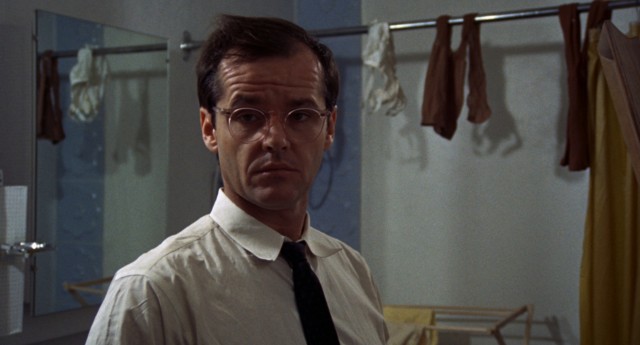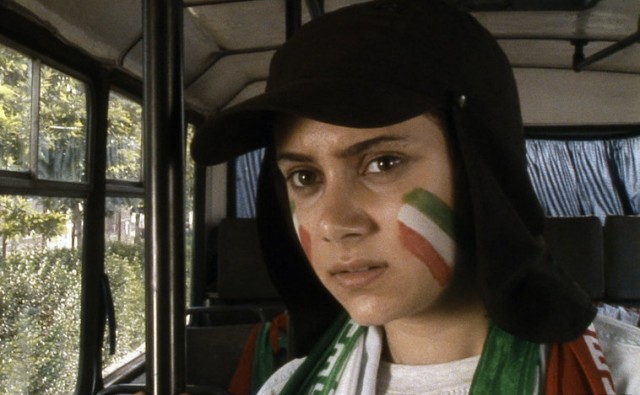
Ang Lee’s LIFE OF PI will open the fiftieth annual New York Film Festival
Alice Tully Hall, 1941 Broadway at 65th St.
Walter Reade Theater, 165 West 65th St. at Amsterdam Ave.
Elinor Bunin Munroe Film Center: Francesca Beale Theater, Howard Gilman Theater, Amphitheater, 144 West 65th St. between Broadway & Amsterdam Ave.
Bruno Walter Auditorium, 111 Amsterdam Ave. between West 64th & 65th Sts.
September 28 – October 14
212-875-5601
www.filmlinc.com
The New York Film Festival is paying tribute to a pair of milestones this year, as 2012 marks the fiftieth anniversary of the festival, and longtime program director Richard Peña is stepping down after a quarter century of inspired service at the Film Society of Lincoln Center, leaving behind quite a legacy. This year’s festival begins on September 28 with the world premiere of Ang Lee’s Life of Pi, adapted from Yann Martel’s novel, and closes on October 14 with the world premiere of Robert Zemeckis’s Flight, starring Denzel Washington, Melissa Leo, and Don Cheadle. The centerpiece selection is the world premiere of David Chase’s hotly anticipated Not Fade Away, reuniting him with his Sopranos star, James Gandolfini. Other films, by some of the greatest directors from around the globe, include Michael Haneke’s Amour, Cristian Mungiu’s Beyond the Hills, the Taviani brothers’ Caesar Must Die, Noah Baumbach’s Frances Ha, Sally Potter’s Ginger and Rosa, Abbas Kiarostami’s Like Someone in Love, Raúl Ruiz’s Night Across the Street, Brian De Palma’s Passion, Olivier Assayas’s Something in the Air, Alain Resnais’s You Ain’t Seen Nothin’ Yet, and Lee Daniels’s The Paperboy, part of the Gala Tribute to Nicole Kidman.
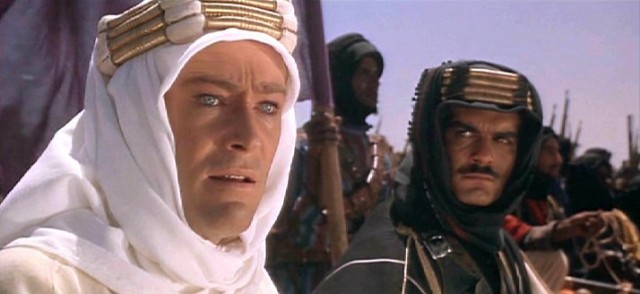
Peter O’Toole’s eyes should shine even more in 4K restoration of David Lean’s LAWRENCE OF ARABIA at the New York Film Festival
The Masterworks section reexamines such films as Amos Gitai’s Field Diary, Bob Rafelson’s The King of Marvin Gardens, Laurence Olivier’s Richard III, Federico Fellini’s Fellini Satyricon, a 4K restoration of David Lean’s Lawrence of Arabia, and Michael Cimino’s Heaven’s Gate, with Cimino on hand to talk about one of Hollywood’s most famous financial disasters. (Was the film really that bad?) Among the special events are Oliver Stone’s Untold History of the United States, theater legend Richard Foreman’s Once Every Day, and a twenty-fifth-anniversary screening of the cult classic The Princess Bride, with a reunion bringing together director Rob Reiner and stars Billy Crystal, Cary Elwes, Carol Kane, Mandy Patinkin, Chris Sarandon, and Robin Wright. The Convergence section looks at cutting-edge technology in cinematic storytelling, with keynote conversations, works-in-progress, and the live multimedia presentation Whispers in the Dark. The annual Views from the Avant-Garde sidebar features works by Ruiz, Peter Kubelka, Chris Marker, Luke Fowler, Nathaniel Dorsky, and others. There will also be a daily talk show, NYFF Live, taking place at 7:00 in the evening in the Elinor Bunin Munroe Film Center Amphitheater with various actors, directors, critics, and other insiders discussing the state of modern cinema.
 The guys who gave the world Thirtysomething (director Edward Zwick and producer Marshall Herskovitz) head to the hills of Japan for this ridiculously sappy and melodramatic piece of tripe starring Tom Cruise as a wayward Civil War hero who rediscovers himself and learns the way of the samurai as modernity threatens to bury the past in a battle of guns versus swords, power versus honor, the government versus the individual. Cruise dances with warriors through this pathetic excuse for an American samurai epic that reduces everything to annoying clichés. It’s an embarrassment from start to finish; at least a sequel is pretty much out of the question. And it’s painful how the film misuses the talent of Hiroyuki Sanada, who was so good in Yoji Yamada’s The Twilight Samurai, his previous film. This mess was written by John Logan, who is responsible for such other duds as Martin Scorsese’s vastly overrated The Aviator and Nemesis, perhaps the worst of all the Star Trek films. The Last Samurai is screening on December 20 at 3:30 as part of the Film Society of Lincoln Center series “All the Right Moves: The Films of Tom Cruise,” comprising seven Cruise favorites, including Risky Business, Rain Man, Jerry Maguire, Mission: Impossible, Born on the Fourth of July, and Top Gun.
The guys who gave the world Thirtysomething (director Edward Zwick and producer Marshall Herskovitz) head to the hills of Japan for this ridiculously sappy and melodramatic piece of tripe starring Tom Cruise as a wayward Civil War hero who rediscovers himself and learns the way of the samurai as modernity threatens to bury the past in a battle of guns versus swords, power versus honor, the government versus the individual. Cruise dances with warriors through this pathetic excuse for an American samurai epic that reduces everything to annoying clichés. It’s an embarrassment from start to finish; at least a sequel is pretty much out of the question. And it’s painful how the film misuses the talent of Hiroyuki Sanada, who was so good in Yoji Yamada’s The Twilight Samurai, his previous film. This mess was written by John Logan, who is responsible for such other duds as Martin Scorsese’s vastly overrated The Aviator and Nemesis, perhaps the worst of all the Star Trek films. The Last Samurai is screening on December 20 at 3:30 as part of the Film Society of Lincoln Center series “All the Right Moves: The Films of Tom Cruise,” comprising seven Cruise favorites, including Risky Business, Rain Man, Jerry Maguire, Mission: Impossible, Born on the Fourth of July, and Top Gun.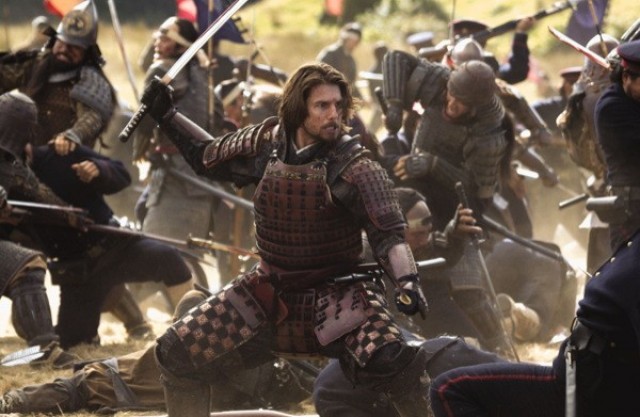
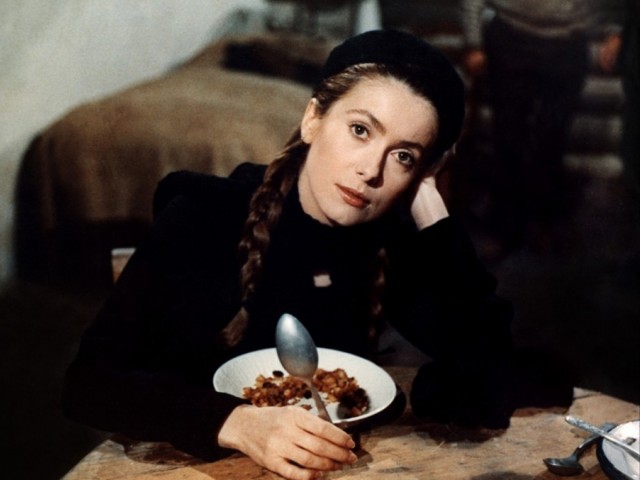
 Luis Buñuel’s adaptation of Benito Pérez Galdós’s 1892 novel Tristana is an often underrated, deceivingly wicked psychological black comedy. A dubbed Catherine Deneuve stars as the title character, a shy, virginal young orphan employed in the household of the aristocratic, atheist Don Lope (Fernando Rey), an avowed atheist and aging nobleman who regularly spouts off about religion and the wretched social conditions in Spain (where the Spanish auteur had recently returned following many years living and working in Mexico). Soon Don Lope is serving as both husband and father to Tristana, who allows the world to pile its ills on her without reacting — until she meets handsome artist Horacio (Franco Nero) and begins to take matters into her own hands, with tragic results. Although Tristana is one of Buñuel’s more straightforward offerings with regard to narrative, featuring fewer surreal flourishes, it is a fascinating exploration of love, femininity, wealth, power, and a changing of the old guard. Deneuve is magnetic as Tristana, transforming from a meek, naive, gorgeous girl into a much stronger, and ultimately darker, gorgeous woman. Lola Gaos provides solid support as Saturna, who runs Don Lope’s household with a firm hand while also taking care of her deaf son, Saturno (Jesús Fernández), yet another male who is fond of the beautiful Tristana. The film is one of Buñuel’s most colorful works, wonderfully shot by cinematographer José F. Aguayo, who photographed Buñuel’s 1961 masterpiece Viridiana, which was also based on a novel by Galdós and starred Rey. Tristana is screening December 15 at 5:30 as part of the Buñuel sidebar at the Film Society of Lincoln Center’s “Spanish Cinema Now” series, which continues through December 16 with such other films as Pedro Pérez Rosado’s Wilaya, Alvaro Longoria’s Sons of the Clouds, and Viridiana.
Luis Buñuel’s adaptation of Benito Pérez Galdós’s 1892 novel Tristana is an often underrated, deceivingly wicked psychological black comedy. A dubbed Catherine Deneuve stars as the title character, a shy, virginal young orphan employed in the household of the aristocratic, atheist Don Lope (Fernando Rey), an avowed atheist and aging nobleman who regularly spouts off about religion and the wretched social conditions in Spain (where the Spanish auteur had recently returned following many years living and working in Mexico). Soon Don Lope is serving as both husband and father to Tristana, who allows the world to pile its ills on her without reacting — until she meets handsome artist Horacio (Franco Nero) and begins to take matters into her own hands, with tragic results. Although Tristana is one of Buñuel’s more straightforward offerings with regard to narrative, featuring fewer surreal flourishes, it is a fascinating exploration of love, femininity, wealth, power, and a changing of the old guard. Deneuve is magnetic as Tristana, transforming from a meek, naive, gorgeous girl into a much stronger, and ultimately darker, gorgeous woman. Lola Gaos provides solid support as Saturna, who runs Don Lope’s household with a firm hand while also taking care of her deaf son, Saturno (Jesús Fernández), yet another male who is fond of the beautiful Tristana. The film is one of Buñuel’s most colorful works, wonderfully shot by cinematographer José F. Aguayo, who photographed Buñuel’s 1961 masterpiece Viridiana, which was also based on a novel by Galdós and starred Rey. Tristana is screening December 15 at 5:30 as part of the Buñuel sidebar at the Film Society of Lincoln Center’s “Spanish Cinema Now” series, which continues through December 16 with such other films as Pedro Pérez Rosado’s Wilaya, Alvaro Longoria’s Sons of the Clouds, and Viridiana.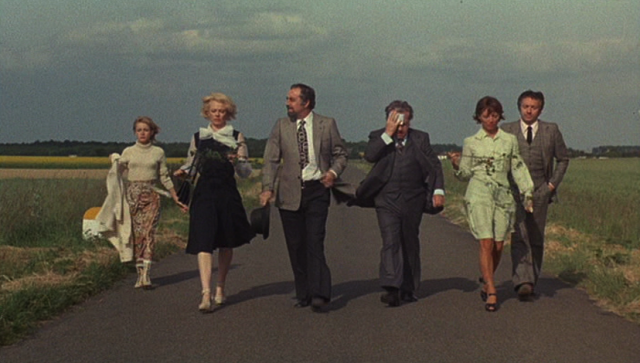
 Winner of the 1972 Oscar for Best Foreign Language Film, Luis Buñuel’s The Discreet Charm of the Bourgeoisie is a sharp, cynical skewering of the European power structure, taking on the high-falutin’ hypocrisy of the government, the military, religion, and, primarily, the wealthy class in hysterical vignettes that center around a group of rich friends trying to sit down and enjoy a meal. But every time they get close, they are ultimately thwarted by miscommunication, a corpse, army maneuvers, terrorists, and, perhaps most bizarrely, fake stage chicken. Buñuel regular Fernando Rey is a hoot as Rafael Acosta, the cocaine-dealing ambassador of Miranda who doesn’t take insults well. Stéphane Audran and Jean-Pierre Cassel play the Sénéchals, a lustful couple desperate to finish a romantic rendezvous even as their guests wait, Julien Bertheau is the local bishop who moonlights as a gardener, Claude Piéplu is an erudite colonel not afraid to share his opinion at a haughty cocktail party, and Maria Gabriella Maione is a sexy stranger who might or might not be a revolutionary after Acosta. Meanwhile, Acosta doesn’t mind making a play for Simone Thévenot (Delphine Seyrig) right under her husband’s (Paul Frankeur) nose. And Ines (Milena Vukotic), one of the Sénéchals’ maids, watches it all with a wonderfully subtle disdain. As if the first half of the film were not surreal enough, the second half includes a series of riotous dream sequences involving ghostly apparitions and a bit of the old ultra-violence, either outwardly related by characters or as cinematic surprises dished out by the masterful Buñuel. None too discreet about its myriad charms, The Discreet Charm of the Bourgeoisie is having a week-long fortieth-anniversary engagement at the Film Society of Lincoln Center in advance of the annual Spanish Cinema Now series, which runs December 7-16 and includes a special sidebar of Buñuel’s Land Without Bread, Tristana, and Viridiana; when you buy a ticket to Discreet Charm, you can get tickets for any Spanish Cinema Now screening for nine dollars by selecting the “Affiliate” option online or showing your ticket stub at the box office.
Winner of the 1972 Oscar for Best Foreign Language Film, Luis Buñuel’s The Discreet Charm of the Bourgeoisie is a sharp, cynical skewering of the European power structure, taking on the high-falutin’ hypocrisy of the government, the military, religion, and, primarily, the wealthy class in hysterical vignettes that center around a group of rich friends trying to sit down and enjoy a meal. But every time they get close, they are ultimately thwarted by miscommunication, a corpse, army maneuvers, terrorists, and, perhaps most bizarrely, fake stage chicken. Buñuel regular Fernando Rey is a hoot as Rafael Acosta, the cocaine-dealing ambassador of Miranda who doesn’t take insults well. Stéphane Audran and Jean-Pierre Cassel play the Sénéchals, a lustful couple desperate to finish a romantic rendezvous even as their guests wait, Julien Bertheau is the local bishop who moonlights as a gardener, Claude Piéplu is an erudite colonel not afraid to share his opinion at a haughty cocktail party, and Maria Gabriella Maione is a sexy stranger who might or might not be a revolutionary after Acosta. Meanwhile, Acosta doesn’t mind making a play for Simone Thévenot (Delphine Seyrig) right under her husband’s (Paul Frankeur) nose. And Ines (Milena Vukotic), one of the Sénéchals’ maids, watches it all with a wonderfully subtle disdain. As if the first half of the film were not surreal enough, the second half includes a series of riotous dream sequences involving ghostly apparitions and a bit of the old ultra-violence, either outwardly related by characters or as cinematic surprises dished out by the masterful Buñuel. None too discreet about its myriad charms, The Discreet Charm of the Bourgeoisie is having a week-long fortieth-anniversary engagement at the Film Society of Lincoln Center in advance of the annual Spanish Cinema Now series, which runs December 7-16 and includes a special sidebar of Buñuel’s Land Without Bread, Tristana, and Viridiana; when you buy a ticket to Discreet Charm, you can get tickets for any Spanish Cinema Now screening for nine dollars by selecting the “Affiliate” option online or showing your ticket stub at the box office.